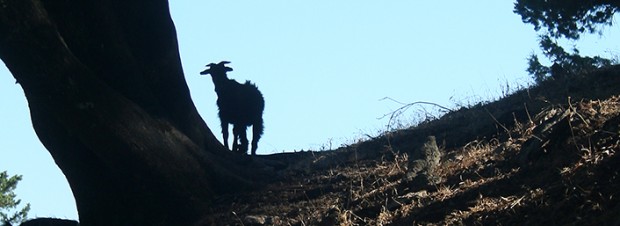What are those funny things dangling from their throats?
These are known as toggles or tassels. They appear on both males and females in quite a few of the different breeds. Not all goats have them. No one knows their original purpose, but they are just hollow pieces of gristle, covered with hair with no known essential purpose.
Do goats need to be tethered?
Tethering is one of the worst ways to keep goats. If done correctly tethering is very time consuming, goats have to be moved frequently and must always have access to shelter and water. Tethered goats are at the mercy of stray dogs and they rarely are as productive as free range animals. Good stock fencing or electric fencing is the best way of retaining goats.
Is it true that goats eat anything?
Goats are very particular about what they eat, they will not consume food of poor quality or food that is dirty or has been trampled on. They require the best quality hay, green stuffs and concentrates (oats, barley, soya, linseed, etc. generally sold as a goat mix). However goats will eat a wide range of food, preferring more fibrous food to lush grass. They will eat young thistles and brambles, as well as twigs, they also like bark from trees. Goats are inquisitive and will nibble and investigate most items (including the proverbial washing off the line!), but they are selective about what they actually eat.
Do goats smell?
It is untrue that all goats smell. Female goats kept in good condition will smell of nothing other than clean straw and sweet hay. As their droppings are of a dry nature they are far easier to keep clean than cows and other farm animals.
Uncastrated male goats do smell. Male goats kept for stud purposes have a very strong distinctive smell, especially during the mating season, (August to March). During this period males should only be handled wearing special clothes as the odour is very strong and difficult to eliminate from skin and clothing. For this reason the keeping of male goats is only recommended for experienced breeders.
Do goats butt?
If goats are brought up correctly and disciplined from an early age they never develop any bad habits. Goats will butt each other, this is quite natural and normal as they develop an order of dominance in the herd. However if corrected from an early age they never butt humans or other animals.
A goat that has been teased may butt people as part of their “play”, which may start as kids, when it is no problem. It can be a problem if this behaviour extends to adult age and size. Hence start correctly: if a small kid pushes against your legs, never push back.
Does goats’ milk have a strong taste?
Goats’ milk that is hygienically produced tastes little different from cows milk. Milk that tastes strong or “goaty’ has not been produced correctly.
Is goat meat tough?
Most goat meat available for sale is kid meat, but some animals are slaughtered when more mature. It is tender and virtually fat free. It is similar to lamb, but has a pleasant flavour of its own. Any male kids that are not wanted for stud work can be reared for meat.
Are male goats the ones with beards?
Almost all goats grow beards, males usually having a longer and more luxuriant growth. Many people who show goats trim the beards off the females as they feel they look more feminine without them. At agricultural shows all goats exhibited will be females, males are rarely shown due to their smell.
Do goats make good lawnmowers?
Not all breeds of goats are good grazers, but some, such as Angoras and Boers graze well, although selectively. Goats generally prefer to browse and like to vary their diet with more fibrous foods. If you need grass kept down, geese or sheep are better grazers, but in the long run, it will be cheaper, and there will be less maintenance if you buy yourself a lawnmower.
Can I use goats’ milk to feed my baby?
“Infant milks based on goats’ milk will no longer be sold in the UK from 17th September 2006
Health care professionals should inform mothers that infant milks based on goats’ milk protein are not suitable as a source of nutrition for infants (under 1 year of age).
Parents use these milks for various reasons but goats’ milk is not suitable for those with an allergy to cows’ milk protein nor for those with lactose intolerance. Alternative formulas can be prescribed for infants with a confirmed diagnosis of milk protein allergy..”
The above statement was issued by Professor Martin Marshall, Deputy Chief Medical Officer, Department of Health.
What steps need to be taken to sell goats milk?
If you are considering selling your milk for human consumption you should make yourself aware of current government regulations. It is recommended that you purchase a copy of the BGS booklet “Easy Dairying“. (see price list). “Production Holdings” need to be registered: “Dairy Establishments”, where milk undergoes some form of treatment or processing, including packaging for retail sale, are subject to additional requirements and further registration. The booklet describes the standards in goat housing and hygiene required to produce milk, which can be sold confidently to the public.
It is illegal to sell milk for human consumption unless the producer has been licensed to do so.
Milk can be sold for other purposes e.g. feeding puppies, without the premises being registered, but labelling must make clear that the product is not for human consumption.

